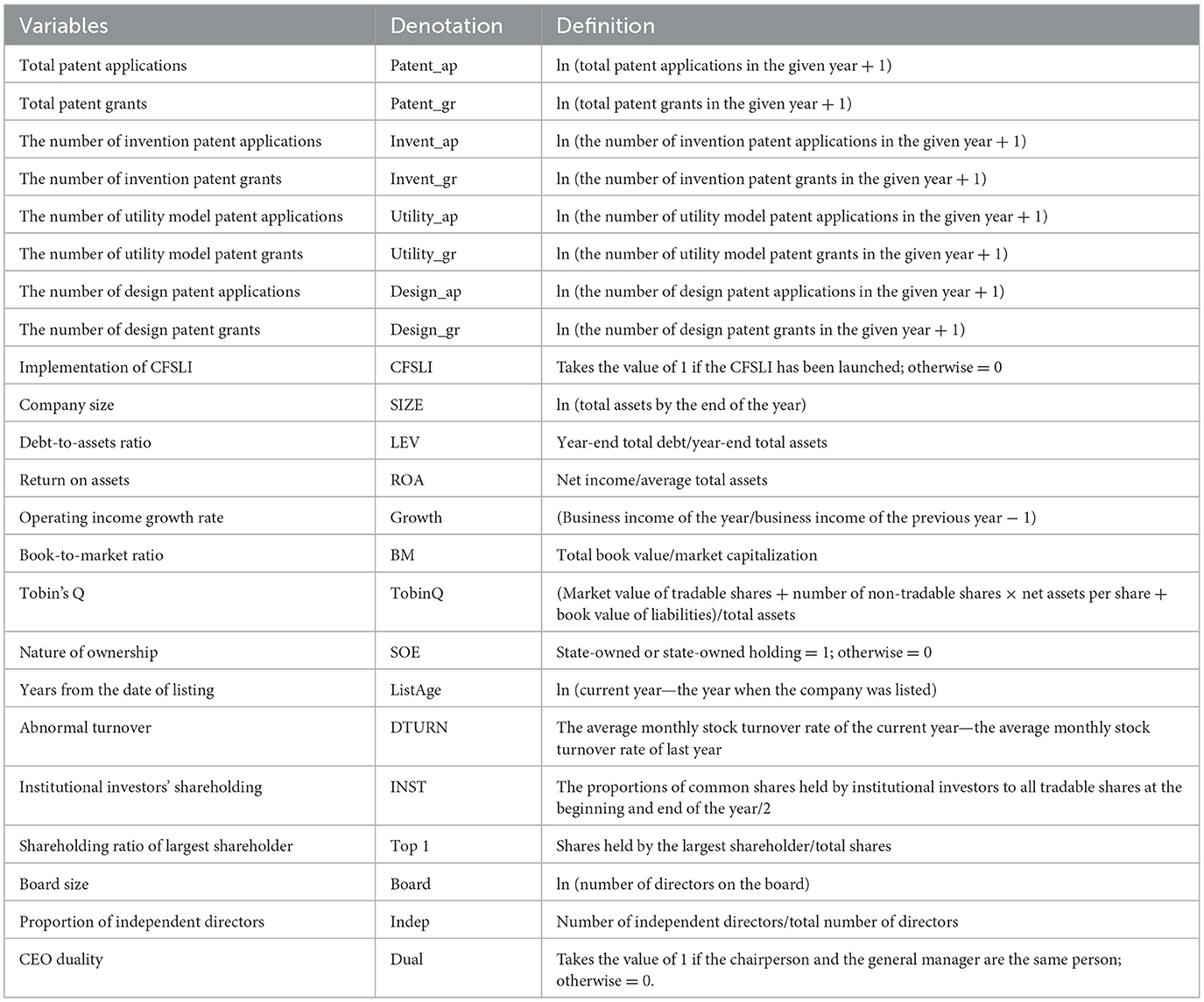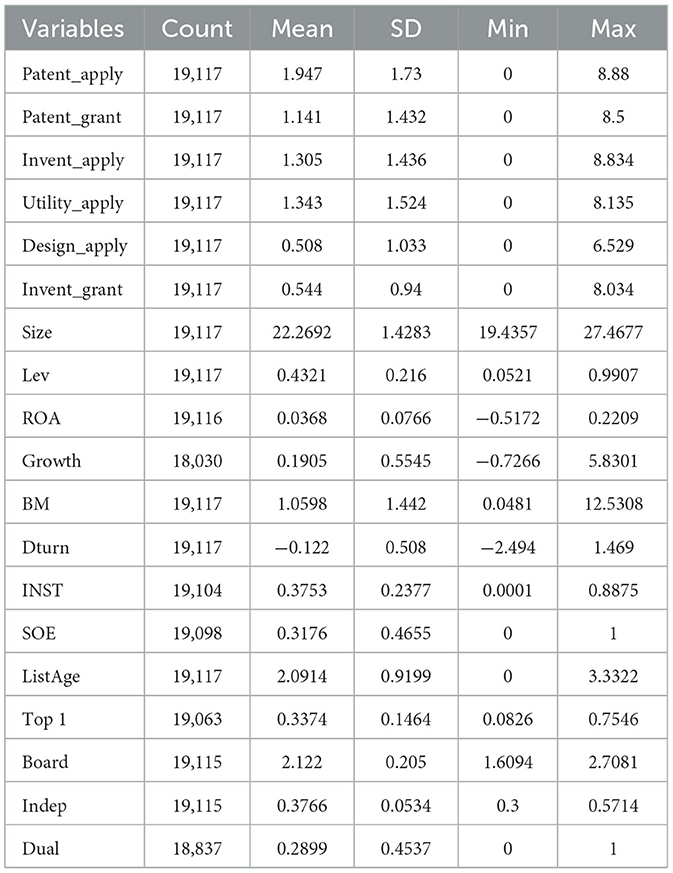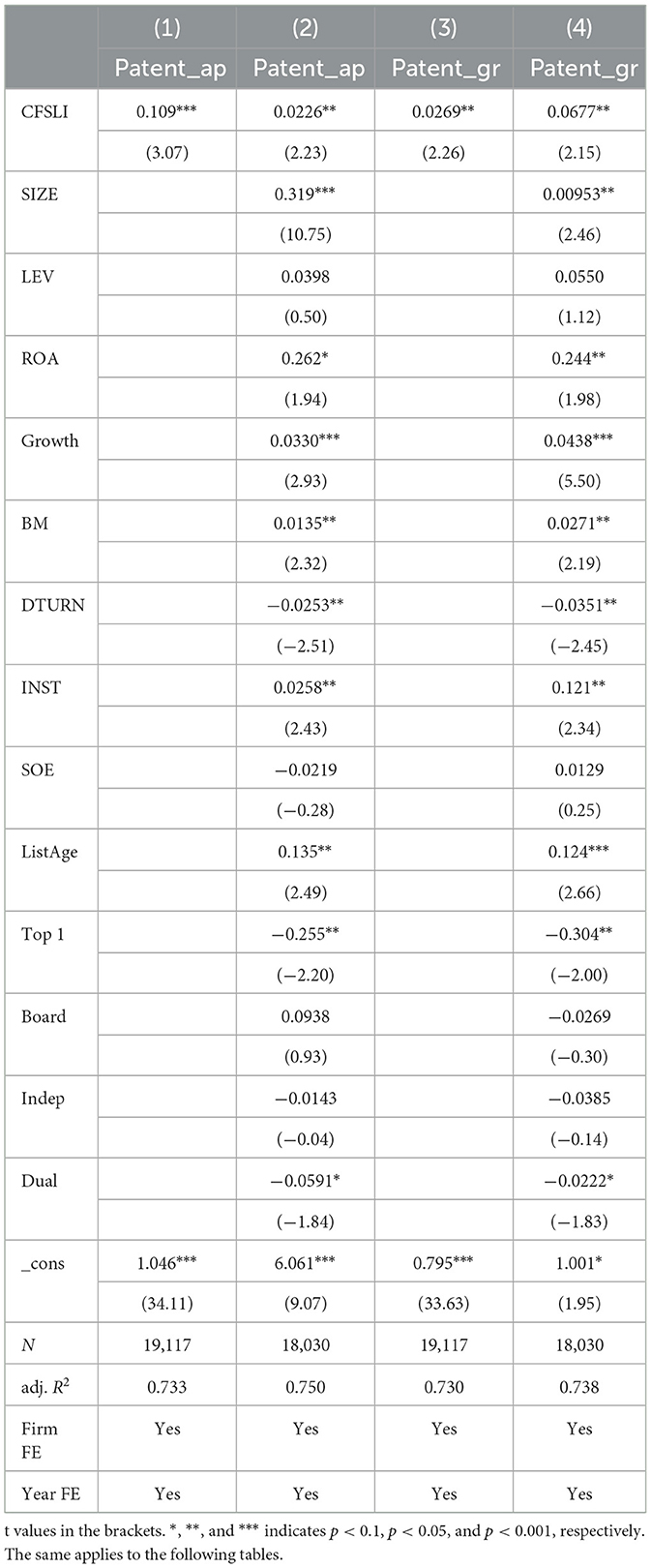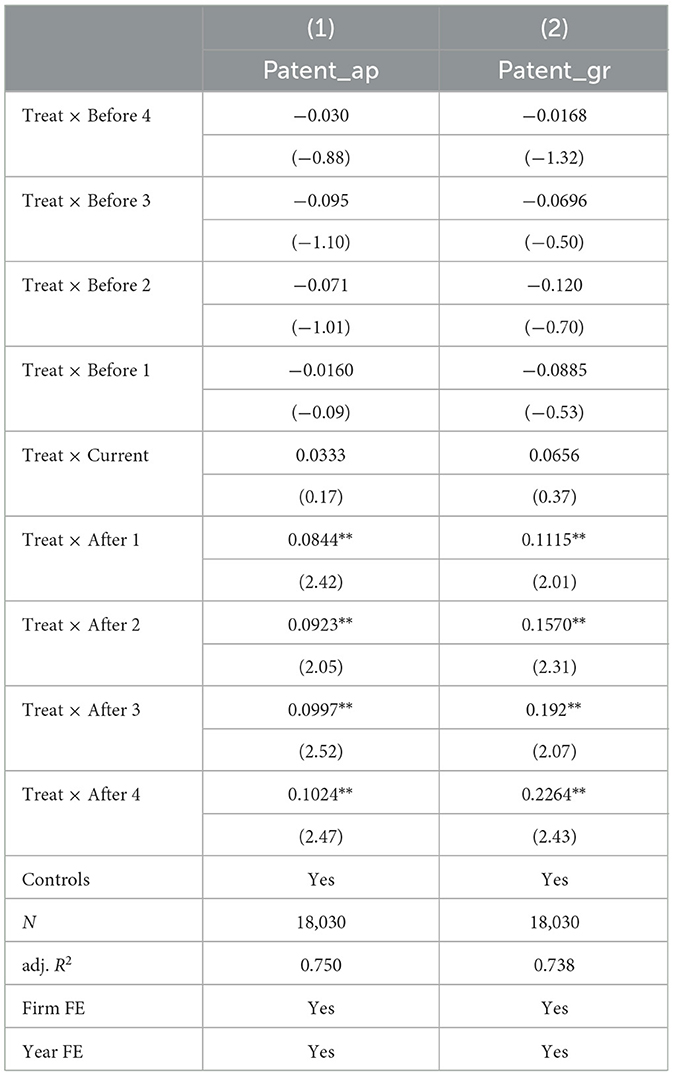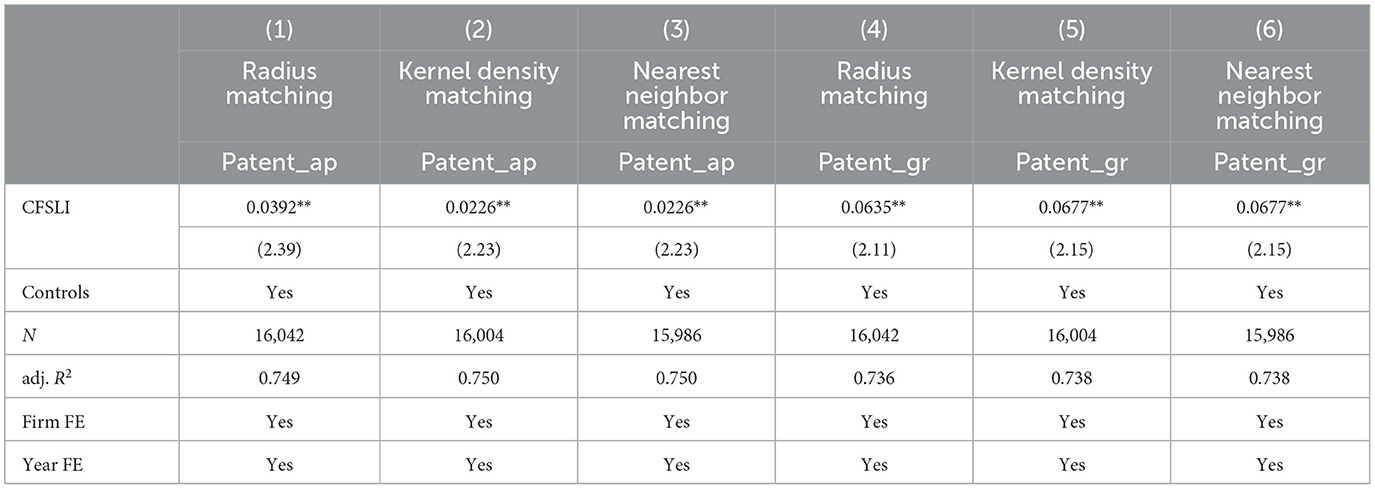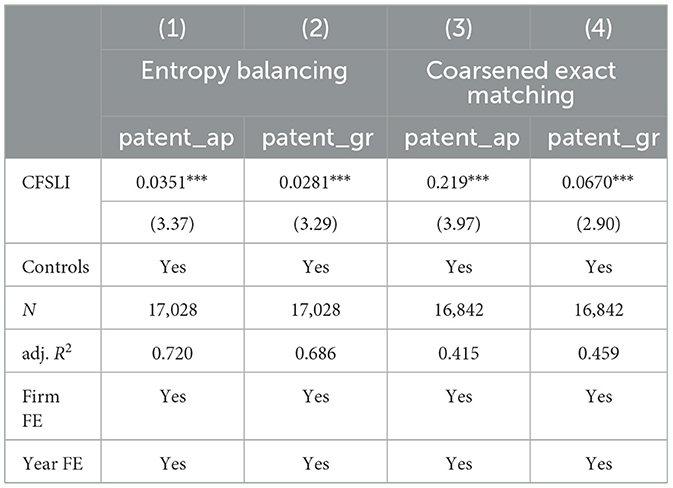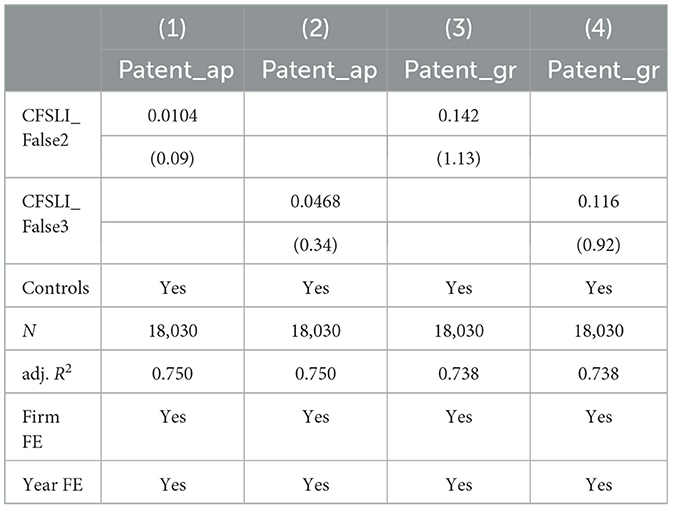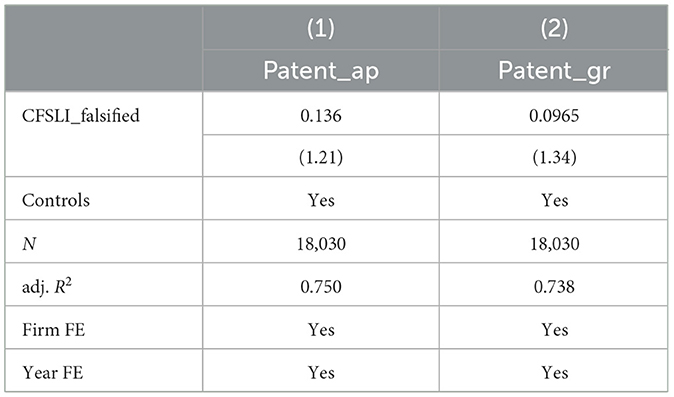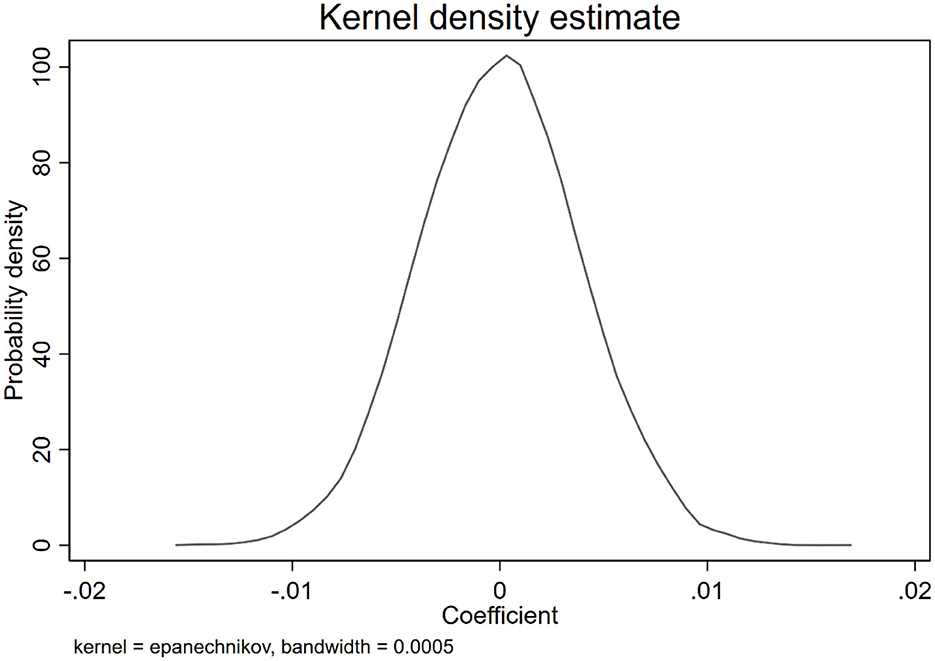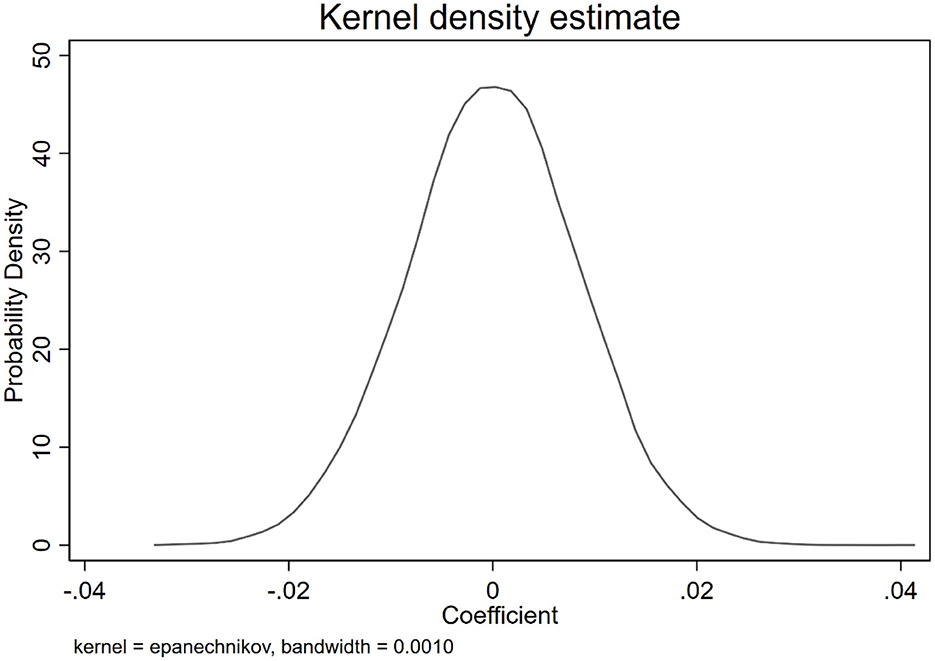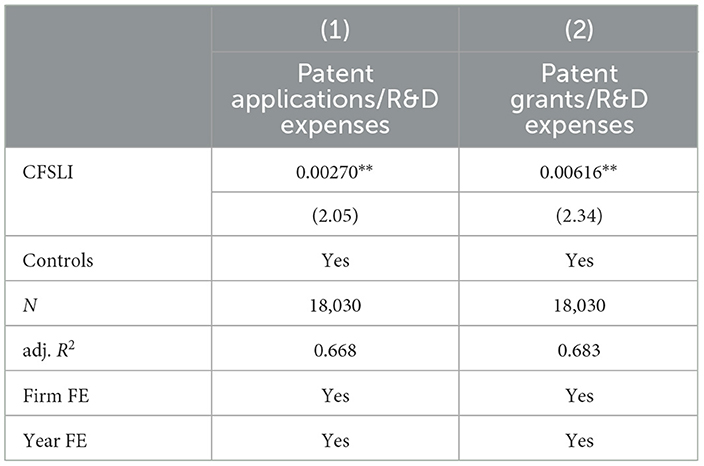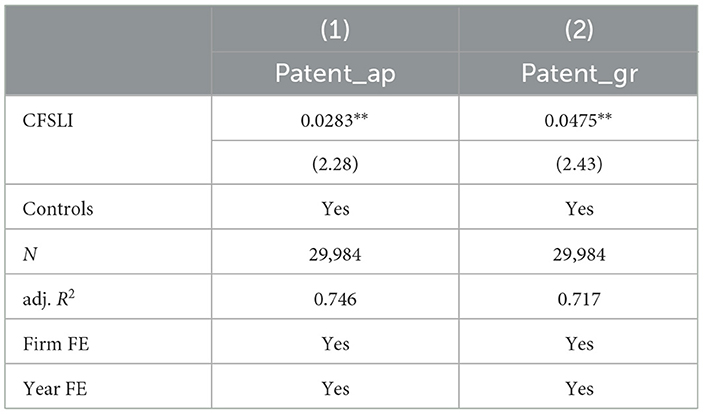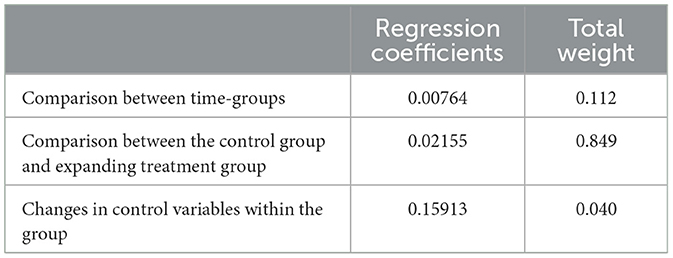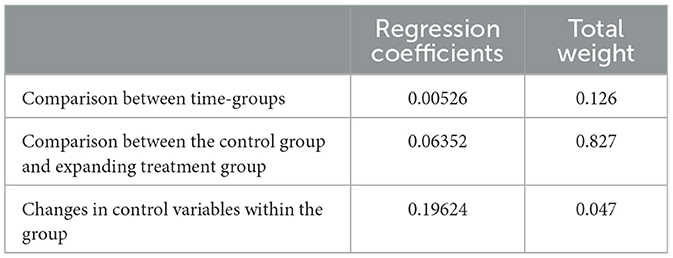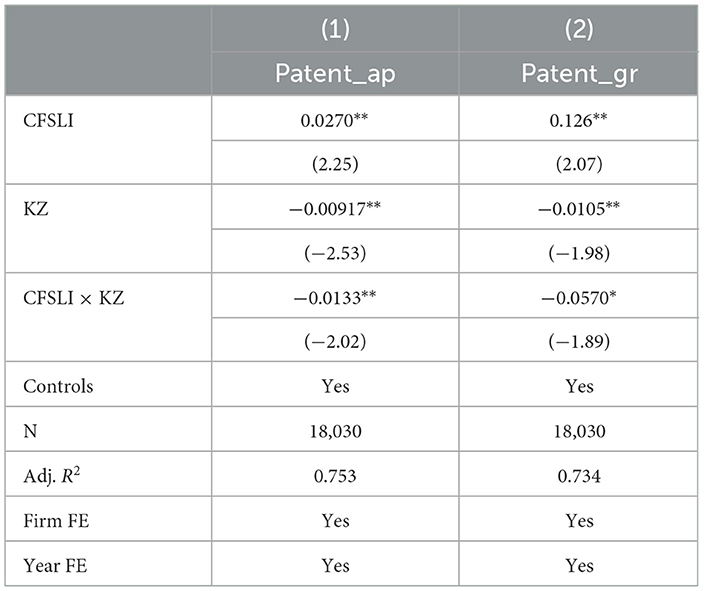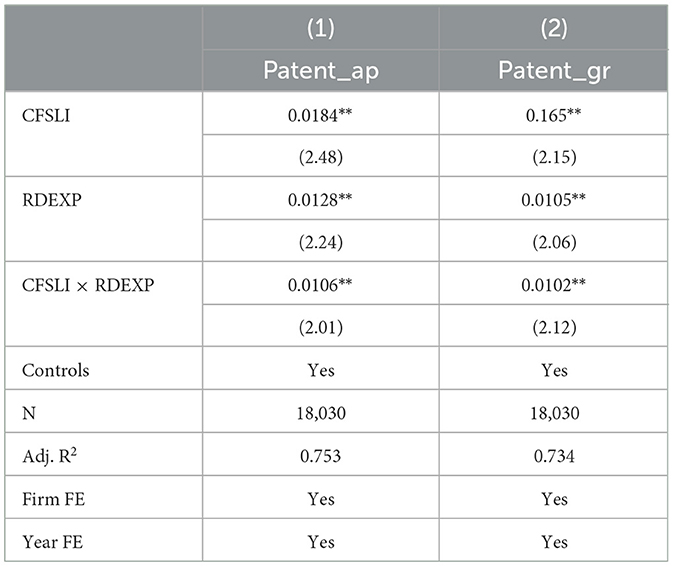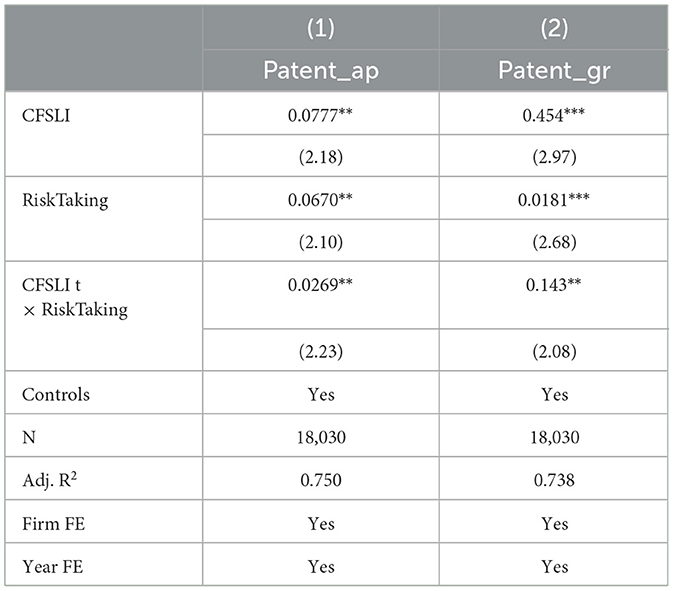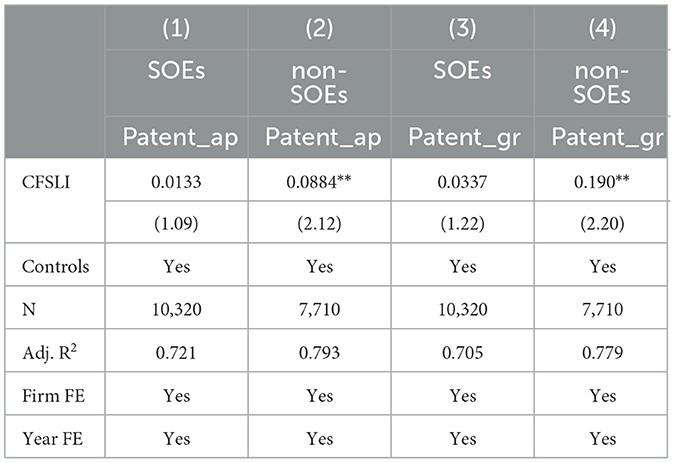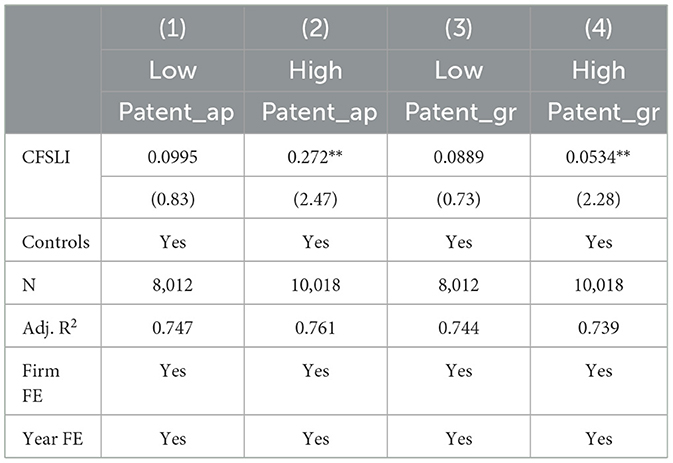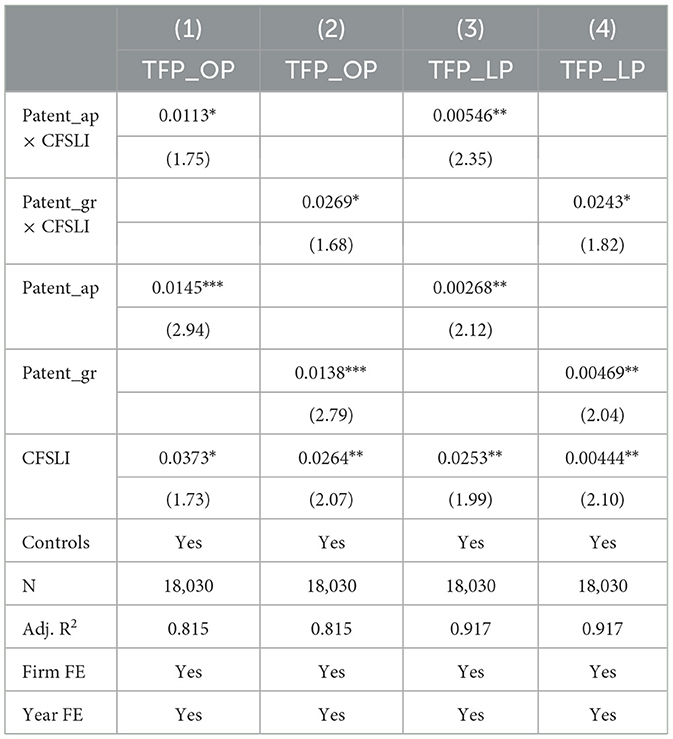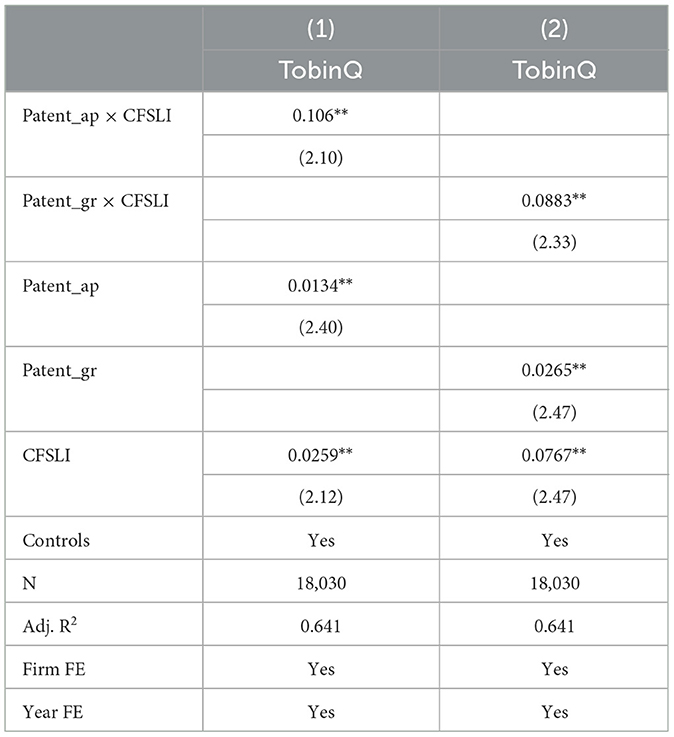- 1School of Economics and Management, Heilongjiang Bayi Agricultural University, Daqing, Heilongjiang, China
- 2SILC Business School, Shanghai University, Shanghai, China
Employing a staggered difference-in-differences design, this study examines the impact of China's Compulsory Food Safety Liability Insurance (CFSLI) policy on corporate innovation within the food industry. Empirical results demonstrate that CFSLI implementation significantly stimulated innovation among affected firms. This positive effect was heterogeneous, exhibiting greater magnitude in non-state-owned enterprises and firms operating in regions with higher levels of marketization. The core findings withstand a comprehensive battery of robustness checks. Investigation into the underlying mechanisms reveals that the policy primarily fosters innovation by alleviating financing constraints, augmenting R&D investment, and enhancing corporate risk-bearing capacity. Beyond stimulating innovation, the CFSLI policy also significantly enhanced the total factor productivity and overall performance of food companies. These findings collectively indicate that the CFSLI policy not only facilitated the effective translation of innovation inputs into outputs but also supported broader corporate growth. This research contributes to the literature by providing novel empirical evidence on the innovation and productivity effects of mandatory liability insurance within the credence goods sector. It offers valuable insights for policymakers seeking to leverage institutional mechanisms, such as liability insurance, to promote innovation and development in analogous industries characterized by information asymmetry, including pharmaceuticals and medical services.
1 Introduction
“The people regard food as their prime concern.”—Sima Qian, Records of the Grand Historian of China, 85 BCE.
China sustains nearly one-fifth of the global population on just 9% of the world's arable land, making food security a fundamental national priority (China Daily, 2022). Food safety, defined as the absence of substances or factors posing acute/chronic health risks to consumers or their offspring (Li, 2016), has faced significant challenges despite economic growth. Recurring food safety incidents have eroded consumer trust in domestic markets and raised concerns about regulatory efficacy. These failures stem partly from the credence attributes inherent to most food products (Darby and Karni, 1973; Nelson, 1970). Credence goods (e.g., organic produce, pharmaceutical efficacy, or automotive safety features) possess qualities consumers cannot verify even after purchase (Caswell and Padberg, 1992). This creates severe information asymmetry, enabling firms to exploit informational advantages for illicit profit (Rouvière and Caswell, 2012). Producers may reduce quality to cut costs, inducing moral hazard, while consumers, unable to discern quality, may withdraw from markets entirely, triggering market failure (Akerlof, 1970).
To counter these failures, China strengthened regulations and market supervision. Food Safety Liability Insurance (FSLI) emerged as a critical supplement to state oversight (Xiao and Tang, 2013; He and Sun, 2016; Duan et al., 2019). FSLI mitigates information asymmetry by incentivizing insurers to monitor producers through risk-based pricing and contractual compensation for safety incidents. This mechanism internalizes accident costs, enhances quality supervision, and rebuilds consumer trust. Regulatory credibility further influences market stability: robust systems localize reputational damage from incidents, while weak systems risk industry-wide distrust and sales collapse. In 2015, China mandated Compulsory Food Safety Liability Insurance (CFSLI) to expand coverage, curb adverse selection, and leverage insurers' expertise in risk management (Duan et al., 2019).
However, while FSLI's role in risk mitigation is established (Duan et al., 2019), its potential to drive corporate innovation remains unexplored. This gap is critical: innovation underpins firm sustainability and high-quality development, yet no study examines whether CFSLI incentivizes food companies to enhance innovation output or performance. Existing research focuses predominantly on macro-level effects of FSLI, neglecting firm-level behavioral responses, particularly regarding innovation.
This study investigates whether China's CFSLI policy spurs corporate innovation among food producers. Using the staggered provincial rollout of CFSLI mandates as a quasi-natural experiment, we analyze A-share listed food companies from 2007 to 2018 using staggered difference-in-differences (DID) estimation. Results demonstrate that CFSLI significantly boosts innovation, especially in non-state-owned enterprises and high-marketization regions. Mechanism tests reveal this operates through eased financing constraints, increased R&D investment, and enhanced risk-taking capacity. Additionally, CFSLI elevates total factor productivity (TFP) and overall firm performance. Robustness checks, including parallel trends, dynamic effects, propensity score matching (PSM), and placebo tests, support causal inference.
This study offers three key contributions to the literature. First, it uniquely investigates the implementation of the CFSLI policy through the lens of corporate innovation, an underexplored perspective grounded in the theory of correcting market failures for credence goods. Second, it empirically identifies the underlying mechanisms through which this policy operates. Third, the analysis rigorously examines the policy's positive economic consequences for enhancing corporate innovation. Collectively, these findings provide actionable insights for refining and scaling the CFSLI policy, novel micro-empirical evidence linking market failure correction in credence goods markets to corporate innovation outcomes, and practical guidance for fostering innovation in sectors like pharmaceuticals and healthcare where credence goods prevail.
The Chinese CFSLI policy implementation serves as a compelling quasi-natural experiment. Unlike liability insurance schemes in other countries, the CFSLI's compulsory nature significantly mitigates adverse selection, offering a distinct empirical advantage for causal inference.
2 Institutional background, related literature, and hypothesis development
2.1 Institutional background
In 2008, the Chinese government initiated the construction of a food safety credit system, aiming to reduce food safety incidents through strengthened supervision. In 2009, China officially promulgated and implemented the “Food Safety Law of the People's Republic of China” to replace the “Food Hygiene Law of the People's Republic of China.” Replacing “hygiene” with “safety” demonstrates the enhanced emphasis on safety issues. In 2013, the China Food and Drug Administration submitted the “Food Safety Law of the People's Republic of China (Revised Draft)” to the State Council, which also included systems such as CFSLI and the requirement that relevant government departments should conduct safety responsibility interviews and dedicated supervision and inspections of food companies on a regular basis. In 2015, the former China Insurance Regulatory Commission, State Council, and China Food and Drug Administration jointly issued the “Guiding Opinions on Pilot Projects for Implementing Food Safety Liability Insurance,” which required key enterprises such as food processing companies, dairy product companies, catering chains, and school cafeterias to be prioritized when implementing pilot projects for CFSLI. This greatly expanded the coverage of the insurance. In 2019, the State Council officially issued the “Opinions of the Central Committee of the Communist Party of China and State Council on Deepening the Reform and Strengthening Food Safety,” encouraging qualified small and medium-sized enterprises (SMEs) to actively purchase FSLI, which led to the “compulsory participation of key enterprises + voluntary participation of SMEs.”
Although the “Guiding Opinions on Pilot Projects for Implementing Food Safety Liability Insurance” was officially issued in 2015, some regions started the pilot implementation as early as 2008. We thus manually screened the information from provincial insurance regulatory bureaus as well as the policies and policy release dates on the official websites of the provincial governments regarding CFSLI. Provincial party committee's official newspapers were also consulted to identify when the policy was first reported. Among 31 provinces/municipalities/autonomous regions, Jilin, Yunnan, Tibet, Ningxia never participated in the pilot project. Supplementary Table 1 summarizes the timeline.
2.2 Related literature
2.2.1 Information asymmetry in the credence goods market
Due to the intrinsic nature of the properties of goods, the complexity of the market environment, and other factors, all parties involved in the market transactions of interest subjects cannot have equivalent information (Akerlof, 1970; Dulleck et al., 2011; Grosskopf and Pearce, 2017). Some subjects of the transaction have more information than others (Grosskopf and Pearce, 2020), and this information asymmetry is more common in credence goods markets, such as food, pharmaceuticals, and medical services.
From the consumers' point of view, goods can be mainly divided into three categories: search goods, experience goods, and credence goods (Nelson, 1970; Darby and Karni, 1973). Among them, search goods mainly are goods of which consumers before or at the time of purchase can fully grasp the intrinsic quality information, such as price, origin, date of production, brand, size, color, packaging. Experience goods mainly refers to goods whose quality can only be judged by consumers after purchase and use, such as flavor, taste, and freshness. Credence goods mainly refers to goods whose quality cannot be judged by consumers after use, such as hormone and drug residues, whether the nutrition is up to the standard or not, and whether the food additives are over the standard or not. According to this classification, considering the quality characteristics of food safety, food have both the characteristics of experience goods (such as the characteristics of food's aroma, texture, taste, freshness, etc.) and credence goods (such as whether the food contains additives, antibiotics, pesticide residues, and whether the composition of its ingredients is genuine, etc.; Zhou et al., 2004), For the characteristics of food safety, consumers are unable to understand the quality and safety information of food products before purchasing, but they can judge the quality and safety level of food products after purchasing and by virtue of their long-term accumulated purchasing experience. In this case, companies can effectively alleviate the information asymmetry problem between producers and consumers by strengthening the publicity, so as to increase the degree of understanding and recognition of the products by consumers (Alysandratos et al., 2024). Besides, the characteristic of credence goods for food safety refers to the fact that consumers are unable to make effective judgment on the ingredients, additives, pesticide residues, and others of food products, and they are unable to determine whether food products are safe or not from the experience of purchasing these products, and it is difficult for companies to build up a good reputation for the quality of the products using their own strength. This may lead to serious information asymmetry between buyers and sellers of food products (Emons, 1997; Balafoutas et al., 2013), and even the phenomenon of “bad money (low-quality and low-cost products) drives out good money (high-quality and high-cost products).”
2.2.2 Mechanism of liability insurance to alleviate the market failure of credence goods
Liability insurance can effectively alleviate the degree of information asymmetry between enterprises and consumers. It is an important initiative to correct market failure of credence goods (Zhang et al., 2014).
A strand of research pertains to signaling mechanisms like reputation. Food, pharmaceuticals, medical services, and other credence goods are mostly necessities, and consumers repeatedly buy these products. Consumers' purchasing behavior can directly signal their willingness to pay for the products to the producers (Emons, 1997), which can prompt the enterprise to enhance the effective transmission of food quality signals through establishing reputation (Ely and Välimäki, 2003), so as to promote high quality development. Moreover, under the condition of information asymmetry, signaling mechanisms, such as reputation, can also effectively correct market failure problems that may be caused by information asymmetry of reputable goods (Dulleck and Kerschbamer, 2006). For example, although liability insurance and other third-party guarantees are not directly related to the quality of products, the cost of insurance itself can indirectly convey the positive signal of high quality to consumers. This is equivalent to an investment in the reputation of the quality of the product of credence goods producing enterprises, which can effectively alleviate the degree of information asymmetry between consumers and the credence goods producing enterprises. This can also to a certain extent diversify food companies' risks, effectively eliminating their concerns in product sales, thus prompting food and other credence goods producing enterprises to turn market pressure into the driving force of production and operation. Therefore, liability insurance can effectively mitigate market failure of credence goods. In addition, insurance companies and other intermediary organizations can timely and objectively transmit the quality signals of credence goods to consumers by monitoring and recording the transactions in the credence goods market (Alysandratos et al., 2024), improve consumers' understanding of product quality, and effectively reduce low-quality products in the credence goods market.
Another strand of literature investigates the mechanism of internal regulation. Liability insurance mainly internalizes the cost of possible incidents through risk pricing, prompting insurance companies to increase the supervision and management of the quality of the products of the insured enterprises. Therefore, liability insurance can send positive signals to the society and effectively mitigate market failure of credence goods (Lahnstein, 2011). Moreover, to reduce the underwriting risk, liability insurance contractors actively utilize their advantage in information collection to continuously strengthen the supervision and management of the production process of the insured enterprises. By doing so, liability insurance forms a dual governance mechanism for the market of credence goods, such as food, in cooperation with the government's mandatory supervision. It is an important supplement to the government's supervision, and can be regarded as providing consumers with a safe and secure environment. Liability insurance can be regarded as a safety guarantee mechanism for consumers, which can effectively regulate the behavior of enterprises and reduce the probability of major safety accidents, and plays an important role in maintaining food safety and improving the credibility of the government (Ben-Shahar and Kyle, 2012). Besides, under the joint influence of strong government regulation and relevant incentives, liability insurance policy can prompt the government, food companies, and insurance companies to form a stable tripartite equilibrium, which can effectively alleviate the moral hazard and adverse selection problems in the credence goods market (Gong et al., 2013; Martinez et al., 2007). Therefore, liability insurance has become an important economic tool for mitigating market failures of the credence goods market in addition to government regulation (Duan et al., 2019; Zhang and Xie, 2022).
2.3 Hypothesis development
During the implementation of the CFSLI policy, insurance companies play the role of external supervisors. Specifically, a comprehensive risk assessment of the food companies to be insured is conducted, differentiated and accurate quotations based on the severity of potential risks are proposed, and an insurance contract is formulated accordingly. During the insured period, insurance companies usually reinforce the risk supervision and control of the operations of the insured companies. They also continue to optimize the claim settlement mechanisms following each food safety incident to reduce compensation costs, improve insurance coverage, and promote the overall social image of the insurance industry. Moreover, the contract essentially allows insurance companies to guarantee the quality of the underwritten products with their own reputation. It is equivalent to sending a signal of food safety to consumers, so that consumers can more accurately identify quality products prior to purchase. In other words, it reduces the information asymmetry between food companies and consumers.
Given the mandatory nature of insurance, CFSLI minimizes the adverse selection risks of food companies, increasing market competition. Food companies with higher risks and fewer development prospects are forced to pay higher premiums. As such, companies are more motivated to standardize their daily operations and management to reduce the probability of food safety incidents. This, in turn, sends positive signals to the society, lowers premiums, reduces daily operating costs, improves overall profits, and ultimately results in higher-quality development. In addition, to ensure product quality and improve the production processes and efficiency, food companies are likely to encounter practical problems such as the need to upgrade or replace existing production lines or purchase new machinery and equipment. However, some companies might face problems due to a shortage of funds. To resolve these issues, the companies may take loans from financial institutions or seek government subsidies. Prior to the approval of loans, financial institutions require a full evaluation of business status, company size, and future development prospects. In the case of food companies, their strict compliance with government requirements (e.g., having CFSLI) and their societal reputation are also among the evaluation criteria. The government conducts even stricter qualification reviews than financial institutions prior to granting subsidies. The companies' taxes, social contributions, operations, type, cash flow, and profitability are all evaluated. Given that government subsidies tend to be large amounts and do not need to be repaid, competition is intense. Therefore, to excel and obtain funds from either the government or financial institutions, food companies may adopt differentiated competition strategies, such as enacting active social responsibility policies and increasing patent applications, in addition to ensuring sound daily operations. With these measures, companies are more likely to receive positive evaluations and be granted subsidies and loans, which reduces capital shortages and insurance premiums and induces companies to increase innovation outputs. Therefore, the implementation of the CFSLI policy promotes corporate innovation by reducing financing constraints.
Following the implementation of the CFSLI policy, insurance companies are likely to actively exert their advantages in information collection to reduce underwriting risks, strengthen the supervision and management of production in the insured companies, and form a dual governance mechanism together with the government for the credence goods market. This, in turn, increases the survival and development pressures on food companies. In this context, even if some companies have obtained government subsidies or loans, they are likely to increase their investment in quality supervision and research and development (R&D) to enhance core competencies, reduce financing constraints, and gain competitive advantages. Moreover, with the increase in R&D expenditure, R&D activities are accelerated and companies are likely to obtain new technologies, gain new advantages, and lead the development of the food industry. These innovation outputs have, in turn, a technology spillover effect and generate additional profit returns for food companies, thus promoting market value and core competencies. Additionally, according to the drivers of innovation theories, the high returns of food companies' innovative outputs tend to further stimulate their enthusiasm for R&D and innovation. With the implementation of the CFSLI policy, food companies are likely to seize opportunities for reform, ensure product quality, improve innovation capacity, and gain greater competitive advantages. Besides, food companies can increase investment in ongoing R&D activities, and implement better management and control to achieve technological progress and product upgrades. Since the implementation of the CFSLI policy reduces the information asymmetry between enterprises and stakeholders, a continuous increase in R&D investment also sends positive signals to stakeholders (e.g., consumers and shareholders), which is conducive to establishing a positive social image, promoting the purchase confidence of consumers and investment confidence of shareholders, reducing financing constraints, and promoting significant development. Therefore, the implementation of the CFSLI policy promotes corporate innovation by stimulating investment in R&D.
Following the implementation of the policy, the trust between consumers and food companies can be re-established, which reduces the operational risk of food companies and the negative impact on sales. This in turn improves the risk-taking capacity. R&D activities can be regarded as a high-risk strategic investment. A large, continuous, and stable supply of funds is an important factor for maintaining performance and cultivating sustainable development potential in the future. Since financing constraints have been alleviated through government subsidies or bank loans during the early stages of development, food companies are more capable of taking risks. As such, they are more likely to seize the development opportunities brought by the CFSLI policy, adopt a higher-risk strategy, and enhance their core competitiveness through continuous increases in R&D investment and the development of new products. In addition, according to the input–output model, corporate innovation activities are usually considered a long-term investment, and high risks and a long cycle of return on investment are some of the problems faced by companies during this process. Reducing investment in the later R&D stages not only hinders the invested activities, leading to the failure of R&D projects and reducing the benefits obtained from innovation outputs, but also increases operating costs and investment risks, which may jeopardize business survival. Most food companies tend to focus on certain business types. Although the implementation of the CFSLI policy has reduced market failures, compared with companies in other industries, they still face greater external risks. To attain significant development, these companies are inclined to actively face risk and implement strategic measures that utilize resource endowments to cope with the inherent challenges; in doing so, they convert high risks to potential high profits to enhance their core competencies and achieve sustainable development. Therefore, the implementation of the CFSLI policy promotes corporate innovation by promoting food companies' risk-taking capacity.
Based on the above analysis, the following hypothesis is proposed:
H1: The implementation of CFSLI significantly promotes corporate innovation.
3 Research design
3.1 Definition of variables
We use the number of patents to measure corporate innovation, which has been widely used in the literature since Scherer (1965) and Griliches (1981). Information about patent applications and grants is from the State Intellectual Property Office of China (SIPO). For each patent, SIPO provides information on the patent application date, application identification, publication identification, granting date, and patent identification, along with inventors and application institutions. We extract patent applications filed by the sample firms, including those filed by their subsidiaries, from the SIPO database to construct measures for a firm's innovative outcomes. The Chinese patent system classifies patents into three types: invention patents, utility model patents, and design patents. Invention patents refer to those granted for a new technical solution to a product or an industrial process. Utility model patents are for new and practical technical solutions relating to certain characteristics of a product, such as the product's shape and structure. This type of patent demonstrates new functional aspects of a product. Design patents are for a product's new shape, pattern, or color that makes the product more attractive and industrially applicable. It is worth noting that the SIPO database does not provide reliable information on patent citations; thus, we are unable to use patent citations to capture the quality of each patent. As pointed out by Tan et al. (2020), invention patents represent the most original inventions among all three types of patents; thus, the number of invention patents can also measure the quality of the patents produced by a firm.
As described earlier, we focus on the explanatory variable CFSLI, which is assigned according to the list of provinces that implemented CFSLI. Treat equals 1 if a listed company belongs to a province that implemented CFSLI; otherwise, it equals 0. Post indicates whether the CFSLI has been launched and equals 0 before the event year and 1 in or after the event year. The interaction of the Treat and Post terms generates the variable of interest CFSLI.
Following Wang et al. (2017), Xia et al. (2019), and Yu et al. (2016), the following control variables were added in the regression: company size (Size), debt-to-assets ratio (Lev), return on assets (ROA), operating income growth rate (Growth), book-to-market ratio (BM), nature of ownership (SOE), years from the date of listing (ListAge), difference in share turnover rate (Dturn), institutional investors' shareholding (INST), shareholding ratio of the largest shareholder (Top 1), size of the board of directors (Board), proportion of independent directors (Indep), and CEO duality (Dual). The definitions of the variables are shown in Table 1.
3.2 Identification strategy and model setup
The staggered implementation of the CFSLI policy provides an ideal quasi-natural experiment. We adopt a DID method embedded in the two-way fixed-effects model to explore its impact on corporate innovation. The DID approach has two key advantages. First, the DID methodology rules out omitted time trends that are correlated with the implementation of CFSLI and corporate innovation in both provinces that implemented CFSLI (the treatment group) and provinces that did not implement CFSLI (the control group). Second, the DID approach controls for constant unobserved differences between the treatment and the control groups that may bias our estimation. The baseline regression model is defined as follows:
where Patent represents the innovation capacity of the listed company i in year t; CFSLI is a dummy variable for participation in the CFSLI policy. CV symbolizes the control variable set; Firm and Year are company and year fixed effects, respectively; and ε is the random error term. CFSLI is the variable of interest. It measures the difference in corporate innovation between food companies that implemented the CFSLI policy and other companies that did not after the launch of the pilot project, thereby identifying the net effect of CFSLI controlling other factors that affect corporate innovation. If CFSLI truly promote corporate innovation, the coefficient β1 of CFSLI should be higher than zero. All standard errors are clustered at firm level.
4 Empirical tests
4.1 The data
This study utilizes data from all A-share listed companies in China spanning 2007 to 2018. The sample commences in 2007 to align with the implementation of China's new Accounting Standards, thereby avoiding inconsistencies arising from accounting standard changes. The sample period concludes in 2018 primarily due to the dependent variables: corporate patent applications and grants. Patent examination involves significant time lags, especially for invention patents. Applications enter an 18-month confidentiality period after formality examination before publication, followed by substantive examination, which typically requires over a year. Consequently, patent applications filed near the sample end exhibit a high proportion of pending determinations. Extending the sample beyond 2018 would introduce severe truncation bias, compromising data quality.
We implemented the following screening procedures: (1) exclusion of financial sector firms, (2) removal of Special Treatment, Particular Transfer, and other abnormally listed firms, and (3) elimination of companies with missing observations. Patent data and financial data were sourced from the China Stock Market and Accounting Research (CSMAR) Database, while firm ownership data originated from the Wind Economic Database. Supplementary data were obtained from the RESSET Financial Research Database, www.cninfo.com.cn (the official disclosure platform for Chinese listed companies), and the China Statistical Yearbook on Science and Technology. To mitigate the influence of extreme values, all continuous variables were winsorized at the 1st and 99th percentiles.
Given that patent data for some firms were substantially incomplete, potentially inducing sample selection bias, we analyzed patterns of missing values and data quality for patent applications and grants. Benford's Law was applied to identify potential data irregularities. Furthermore, data sourced from CSMAR, Wind, and RESSET were systematically compared. The results confirmed high consistency across the control variables. Descriptive statistics are presented in Table 2.
Our average sample firms have book value assets of RMB 4.692 billion (or approximately USD 655 million) and are 7 years old. The average firms are levered with a book leverage ratio of 43.2%. Sample firms have a sizable growth rate of 19%. Institutional investors on average hold 47.53% of total shares. State-owned-enterprises account for 31.76% of the total observations. In terms of performance, sample firms perform well with an average ROA of 3.68% and book-to-market ratio of 1.0598.
4.2 Baseline regression results
The baseline regression results are shown in Table 3. Column (1) presents the univariate regression results. The regression coefficient of CFSLI is 0.109 (p < 0.01), indicating that, following the implementation of the policy, corporate innovation significantly improved; hence, H1 is supported. Column (2) shows the regression results following the introduction of control variables. The regression coefficient of CFSLI is 0.0226 (p < 0.05), verifying the result of the univariate regression when controlling for other factors. Columns (3) and (4) presents the results when replacing the patent applications with patent grants. The regression coefficients are 0.0269 and 0.0677, respectively (p < 0.05), indicating that the implementation of the policy significantly improved corporate innovation. The results using patent grants are generally consistent with those when using patent applications, showing the results are robust. Based on the above results, H1 is supported.
To better analyze the impact of CFSLI on corporate innovation and differences in the impact on different types of patents, the explained variable in the original model was replaced with invention patent (Invent), utility model patent (Utility), and design patents (Design), respectively. The results are shown in Table 4. Columns (1), (3), and (5) show that the coefficients of CFSLI are 0.0246, 0.0639, and 0.0206, respectively (p < 0.05), indicating that the number of the applications for all types of patents increased significantly following the implementation of the policy. Columns (2), (4), and (6) are the results for replacing patent applications with patent grants, and the regression coefficients of CFSLI are 0.0798, 0.127, and 0.0262, respectively (p < 0.05). These results echo those of using patent applications and confirm the positive effect of the implementation of the policy on corporate innovation.
4.3 Testing for endogeneity
4.3.1 Parallel trends and dynamic effects
The premise of applying the DID model is that the sample satisfied the parallel trend assumption before the policy was implemented. Following Chen et al. (2020), we define 10 dummy variables, Before 5+, Before 4, Before 3, Before 2, Before 1, Current, After1, After 2, After 3, and After 4, to indicate the year relative to the implementation of the CFSLI policy. For example, Current indicates the year in which the policy is implemented; Before 22 indicates that it is 2 years before the implementation; and After 2 indicates that it is 2 years after the implementation. Then we re-estimate Equation 1 by replacing the implementation indicator with the ten indicators above with Before5+ as the base group. The results are shown in Table 5.
The regression coefficients of Treat × Before 4, Treat × Before 3, Treat × Before 2, Treat × Before 1 indicators are especially important because their significance and magnitude indicate whether there is any difference in innovation between the treatment group and the control group prior to the policy change. The coefficients on all four indicators are close to zero and not statistically significant across both columns, indicating that the parallel trends assumption of the DID approach is not violated. The absence of any significant lead effects has at least three implications. First, the implementation of CFSLI does not seem to be anticipated by the treated firms. Second, even if some treated firms anticipated such policy changes, the actual compulsory purchasing of the insurance did not change until the policies took effect. Third, the positive effect of CFSLI on innovation is not the result of policymakers simply responding to past innovation activities, mitigating the reverse causality concern. Besides, the coefficients of Treat × Current is also small in magnitude and insignificant in both columns. The impact of the policy change starts to show up 1 year after the implementation: the coefficients of indicator Treat × After 1 become significantly positive in both columns. The coefficients on Treat×After2, Treat×After3, Treat×After4 are all significant and increasing in magnitude, indicating that it takes time to reveal the full impact of CFSLI on corporate innovation. This is understandable given that innovation is usually a long-term process.
4.3.2 Propensity score matching
A suitable control group is essential for the accuracy and credibility of the DID method. This study sets food companies in provinces that did not implemented the CFSLI policy as the control group, ignoring the inherent differences in corporate innovation and other aspects between listed firms in the treatment and control groups, which may cause the DID method's estimation results to be unreliable. We employ the PSM method to match firms in the treatment group with those in the control group to reduce the systemic bias and other endogeneity problems of the DID method; we thus overcome the systematic differences in the corporate innovation trends between the treatment and control groups. We conduct logit regressions on the control variables to obtain the PSM. Following Jiang and Wu (2024), three different matching methods (i.e., radius, kernel density, and nearest neighbor matching) were used. The results are shown in Table 6.
Columns (1)–(3) show that the regression coefficients of CFSLI are 0.0392, 0.0226, and 0.0226, respectively (p < 0.05), which indicates that, following the implementation of the policy, food companies' innovation capacity improved significantly. Columns (4)–(6) show that the results when replacing patent applications with patent grants, and the regression coefficients are 0.0635, 0.0677, and 0.0677, respectively (p < 0.05). These results echo those of using patent applications and confirm the positive effect of the implementation of the policy on corporate innovation.
4.3.3 Entropy balancing and coarsened exact matching
The robustness of the results was also tested using alternative matching methods. Entropy balancing (EB) is based on the idea of constrained optimization. It assigns a continuous weight to each observation of the control group to ensure the distribution moments (mean, variance, and skewness) between the treatment and control groups on each covariate were proximate, thereby eliminating the differences in each covariate between the observations in the two groups. Compared to PSM, EB has two advantages: (1) it takes minimizing the differences in the moments of covariates as its optimization goal, which ensures that the distributions of the treatment and control groups are proximate in the higher-order moments of each covariate, while PSM cannot achieve this effect, and (2) when performing EB, the only parameter that requires objective setting is the tolerance level of the results of the iterative algorithm, while PSM has concerns caused by subjective setting of the details (e.g., the variable selection in step one when calculating the propensity scores and model setting, whether matching with replacement should be performed, and whether the matching should be 1:1 or 1:n).
Additionally, PSM cannot ensure that balancing is improved after matching, while coarsened exact matching (CEM) processes the confounding factors in the observed data to balance the distributions of the covariates between the treatment and control groups, thereby improving data comparability. In CEM, the maximum imbalances between the treatment and control groups are chosen in advance, rather than discovered during the review and evaluation stages. Moreover, changing the maximum imbalance of one variable does not affect that of any other variables. CEM groups variables according to criteria set during pre-selection. While retaining essential information, the matching efficiency is improved and the model dependencies and estimation error of the average treatment on the treated are limited. CEM also limits the data to the common support ranges, and conforms to the principle of consistency. It is less sensitive to measurement errors. It allows for multiple imputation when dealing with missing data.
The results of EB and CEM are shown in Table 7. Columns (1) and (2) show that the regression coefficients of CFSLI following EB are 0.0351 and 0.0281, respectively (p < 0.01). Columns (3) and (4) are the results following CEM. The regression coefficients of CFSLI are 0.219 and 0.0670, respectively (p < 0.01). These results confirm that food companies' innovation improved significantly following the implementation of the CFSLI policy.
4.3.4 Placebo tests
There might be policies or influencing factors other than the CFSLI that may induce corporate innovation enhancement during the same period. To rule out the possibility that corporate innovation might have been heightened by other contemporaneous policies, following Topalova (2010), we perform a placebo test by falsifying the year the policy was initiated. We assume that the CFSLI was implemented 2 or 3 years before the actual date and observe the coefficient and significance of the policy variable. If the estimated coefficient of the policy variable is insignificant under the two placebo tests, the CFSLI improves food companies' corporate innovation. If the two falsified policy variables are significant, CFSLI implementation does not necessarily cause corporate innovation enhancement in food companies. Table 8 presents the results.
When assuming the CFSLI was proposed 2 years or 3 years before the actual event year, the estimated coefficient of the CFSLI term is not significant. Thus, CFSLI implementation improve food companies' innovation without interference from other policies or factors.
We conducted another placebo test by designating listed companies in the pharmaceutical and medical service industries as the treatment group. As discussed earlier, pharmaceutical and medical services products are also credence goods. The CFSLI policy only pertains to food companies. Hence, we expect that the regression results of the falsified term CFSLI_falsified would be statistically insignificant. The results in columns (1) and (2) of Table 9 showed the results. When assuming listed companies in the pharmaceutical and medical services industries the treatment group, the estimated coefficient of the CFSLI_falsified term is not significant. Therefore, pharmaceutical and medical service companies' innovation was not affected by the implementation of CFSLI, indicating the benchmark results are robust.
We also conduct a placebo test to exclude the influence of unobservable random disturbances on food companies' corporate innovation. From Equation 1, the estimated value of the CFSLI policy coefficients is obtained as follows:
where control includes all control variables; if the estimation of β1 is unbiased, then γ should be zero. It is impossible to judge whether γ is 0 and directly test whether the estimated coefficient of β1 is affected by unobservable random disturbance items; therefore, we set a falsified variable of the CFSLI policy variables (CFSLI_falseit) using a simulation method of randomly assigning values to the firms in the treatment group. Ideally, CGSLI_falseit would have no effect on food companies' corporate innovation. Under this setting, if 0 is still obtained, γ can be inferred to be 0.
The process is repeated 1,000 times to ensure that the placebo test can effectively identify causality. Figure 1 shows the probability density distribution diagram of the estimated coefficient of the CFSLI policy variables. Accordingly, the estimated values of the randomly generated policy variables are densely distributed around zero. The same pattern is observed in Figure 2 in which the explained variable is patents granted. Thus, γ=0 can be deduced to verify no unobservable random disturbance term affects the causal conclusion; that is, the CFSLI policy variables randomly generated have no impact on food companies' innovation. Therefore, the positive and significant CFSLI impact on food companies' innovation is not affected by unobserved random disturbances.
4.4 Robustness checks
4.4.1 Poisson regression
To ensure the robustness of the results, we conduct additional tests using alternative regression methods. The absolute value of the number of patent applications and the absolute value of the number of patent grants were used to measure corporate innovation. Considering that the number of patents is an integer greater than or equal to 0, the Poisson regression model was adopted. The results are presented in Supplementary Table 2. Columns (1) and (2) show the regression coefficients of CFSLI (0.369 and 0.163, respectively) and the results are statistically significant (p < 0.05). The findings are thus generally consistent with those of the benchmark results.
4.4.2 Panel Tobit regression
Companies might decide not to apply for a patent due to factors such as strategic decisions, available resources, and intellectual property protection. Therefore, the number of patent applications and grants of many sampled companies was 0, leading to clustering around the distribution at the value of 0. Hence, the data need to be processed by Tobit regression. However, the Tobit regression model suffers nuisance parameters when controlling for individual fixed effects; hence, the results obtained by conventional maximum likelihood estimation tend to be biased. Additionally, the model only tests for random effects and not for the fixed effect of panel data. Therefore, the Tobit model with panel data was used for robustness check. The results are shown in Supplementary Table 3. From columns (1) and (2), the regression coefficients are 0.0839 (p < 0.01) and 0.0320 (p < 0.05), respectively, confirming that the implementation of CFSLI promoted food companies' innovation.
4.4.3 Alternative measurements of corporate innovation
To further test the robustness of the results, the original measure for corporate innovation was replaced by patent applications/R&D expenses and patent grants/R&D expenses. The results are shown in Table 10. The regression coefficients of CFSLI are 0.00270 (p < 0.05) and 0.00616 (p < 0.05), indicating that the causal relation detected in the benchmark regression remain valid following the replacement of the measurements.
4.4.4 Alternative control group
In the benchmark regression, the listed food companies that implemented CFSLI were categorized as the treatment group and those that did not were categorized as the control group. We check for robustness by expanding industries in the control group. Referring to the “Guidelines for the Industrial Classification of Listed Companies (Revised in 2012)” issued by the China Securities Regulatory Commission, food industry belongs to the manufacturing industry. Therefore, all firms in the manufacturing industry except food companies were designated the control group. The results are presented in Table 11. Columns (1) and (2) show that the regression coefficients of CFSLI are 0.0283 (p < 0.05) and 0.0475 (p < 0.05), respectively, indicating that the results remain consistent using alternative control group.
4.4.5 High dimension fixed effects
Previous empirical results only controlled for firm and year fixed effects. We also included industry-by-year fixed effects to capture time-varying industry trends in the regression, and we included province effects to control for time-invariant provincial characteristics that may affect corporate innovation. The results are reported in Table 12. As shown, the coefficients of CFSLI remain significantly positive in all robustness tests. These results help mitigate the concern that the benchmark results are driven by unobserved secular trends.
4.4.6 Controlling confounding effects
During policy formulation and implementation, a few major changes took place in the capital market of China. To control potential confounding effects caused by margin trading and short selling (MTSS), the Mainland China–Hong Kong Stock Connect (MCHKSC), and replacing business taxes with value-added taxes (RBTVAT), this study modifies Equation 1 by incorporating these events for a robustness check to mitigate the influence of the confounding events. The results are shown in Supplementary Table 4. Columns (1)–(4) show that the regression coefficients of CFSLI in four columns are 0.0503, 0.0169, 0.0226, and 0.0446, respectively (p < 0.05). Columns (5)–(8) are the results for replacing patent applications with patent grants, and the regression coefficients are 0.0894, 0.0866, 0.0677, and 0.110, respectively (p < 0.1). Therefore, the results remain robust when controlling the influence of confounding policies.
Considering that corporate innovation might be affected by other industrial policies implemented over the sample period, all industrial policies issued during the sample period were selected and categorized into three groups: encouragement at the provincial level (EP), key support at the provincial level (KP), and key support at the national level (KN). This study modifies Equation 1 by incorporating these industrial policies for another robustness check. The regression results are shown in Supplementary Table 5. Columns (1)–(4) show that the regression coefficients of CFSLI are 0.0195 (p < 0.05), 0.0383 (p < 0.05), 0.0572 (p < 0.05), and 0.0584 (p < 0.1), respectively. Columns (5)–(8) are the results for replacing patent applications with patent grants, and the regression coefficients are 0.0670 (p < 0.01), 0.0721 (p < 0.05), 0.0752 (p < 0.1), and 0.0761 (p < 0.1), respectively. The benchmark results remain robust when controlling the influence of industrial policies.
4.4.7 Goodman–Bacon decomposition
Goodman-Bacon (2021) found that, when multiple treatment effects occur at different times, the DID standard error may be biased, as the treatment group of an earlier period may be the control group of the treatment group of a later period. Considering that six staggered policy changes in different years were used in this study, we followed Goodman-Bacon (2021) and performed a decomposition on the estimates of different treatment times. The two-way fixed-effects DID model is the weighted average of all likely 2 × 2 variance estimators in the data. The results are shown in Tables 13, 14.
The decomposition shows comparisons between different time groups (early-treatment vs. late-treatment groups and late-treatment vs. early-treatment groups), the units of treatment and control groups (treat vs. control), and changes within the control group. The findings demonstrate that only approximately 11% of the estimated variance originated from the comparisons of temporal heterogeneity among the treatment effects. More importantly, the majority of the estimated differences originated from the comparison between the control group and expanding treatment group. The coefficient on CFSLI when patent application is the explained variable is 0.02155 (while the coefficient is 0.0226 in column (2) of Table 3). The coefficient on CFSLI when patent grants is set as the explained variable is 0.06352 (while the coefficient is 0.0677 in column (4) of Table 3). In conclusion, the results are largely unchanged after addressing the potential biases related to the temporal heterogeneity of treatment effects.
To further address the heterogeneity from treatment timing, three alternative DID methods were introduced, namely the method proposed by Callaway and Sant'Anna (2021), the method proposed by Sun and Abraham (2021), and the stacked DID method proposed by Cengiz et al. (2019).
The estimators using the methods proposed by Callaway and Sant'Anna (2021) and Sun and Abraham (2021) are closely related. Given the heterogeneity of treatment effects, the time-specific treatment effects for individual cohorts were estimated first; then, the treatment effects were converged to generate the overall treatment effect. However, the two approaches differ in flexibility, control variable adjustment, control group selection, and inferences (Baker et al., 2022). According to Cengiz et al. (2019), the stacked DID is used to create event-specific net 2 × 2 datasets for the treatment group and the “pure” control group within the treatment window. Then, the pure 2 × 2 datasets were stacked together and the two-way fixed-effects differences in DID regression were estimated using dataset-specific unit and time fixed effects.
Table 15 reports the static effect estimates of the impact of the CFSLI policy on patent applications. The sample included listed companies impacted within −5 to +5 years relative to the event year during the sample period, as well as pure control companies (observations that were never impacted) for which data were available for all sample years. The coefficients on CFSLI are 0.02051 (Callaway and Sant'Anna, 2021), 0.01874 (Sun and Abraham, 2021), and 0.01779 (Cengiz et al., 2019), respectively. The results are statistically significant at the 5% level. The economic significance of these coefficients is comparable to that in column (2) of Table 3 (0.0226) for the benchmark regression.
Table 16 reports the static effect estimates of the impact of the policy on patent grants. The coefficients on CFSLI are 0.06487 (Callaway and Sant'Anna, 2021), 0.06279 (Sun and Abraham, 2021), and 0.06282 (Cengiz et al., 2019), respectively. The results are statistically significant at the 5% level. The economic significance of these coefficients is comparable to that in column (4) of Table 3 (0.0677) for the benchmark regression.
These results suggest that the main inference of the study remains largely unchanged, both statistically and economically, when alternative DID methods are applied.
4.5 Underlying mechanism
Food companies' strict compliance with government requirements (e.g., having CFSLI) and their societal reputation are important evaluation criteria of obtaining loans. The government conducts even stricter qualification reviews than financial institutions prior to granting subsidies. To excel and obtain funds from either the government or financial institutions, food companies may adopt differentiated competition strategies, such as enacting active social responsibility policies and increasing patent applications, in addition to ensuring sound daily operations. With these measures, companies are more likely to receive positive evaluations and be granted subsidies and loans, which reduces capital shortages and insurance premiums and induces companies to increase innovation outputs. Therefore, the implementation of the CFSLI policy promotes corporate innovation by reducing financing constraints. Following Kaplan and Zingales (1997), we used the KZ index to measure financing constraints. Higher KZ index means greater financing constraints. The relationship between financing constraints, CFSLI, and corporate innovation is tested using Equation 3.
where KZ measures financing constraints, the coefficient on CFSLI × KZ (β3) is the variable of interest. It measures the influence of financing constraints on the relationship between the implementation of the policy and corporate innovation. A negative coefficient indicates that the implementation of the policy promotes corporate innovation through alleviating financing constraints. Table 17 shows the results. From column (1), the regression coefficient on CFSLI × KZ is −0.0133 (p < 0.05). Column (2) shows the results when patent applications were replaced with patent grants and the coefficient on CFSLI × KZ is −0.0570 (p < 0.1). These findings confirm that the implementation of the policy promoted corporate innovation by reducing financing constraints.
Following the implementation of the CFSLI policy, insurance companies are likely to actively collect information to reduce underwriting risks, strengthen the supervision and management of production in the insured companies, and form a dual governance mechanism together with the government for the credence goods market. Food companies react by increasing their investment in quality supervision and R&D to enhance core competencies. With the increase in R&D expenditure, R&D activities are accelerated and companies are likely to obtain new technologies, gain new advantages, and lead the development of the food industry. Since the implementation of the CFSLI policy reduces the information asymmetry between enterprises and stakeholders, a continuous increase in R&D investment also sends positive signals to stakeholders (e.g., consumers and shareholders). Therefore, the implementation of the CFSLI policy promotes corporate innovation by stimulating investment in R&D. The relationship between R&D expenses (RDEXP), CFSLI, and corporate innovation is tested using Equation 4.
where the coefficient on CFSLI × RDEXP (β3) measures the influence of R&D expenses on the relationship between the implementation of the policy and corporate innovation. A positive coefficient indicates that the policy promotes corporate innovation through more R&D expenses. Table 18 shows the results. From column (1), the regression coefficient on CFSLI × RDEXP is 0.0106 (p < 0.05). Column (2) shows the results when patent applications are replaced with patent grants and the coefficient on CFSLI × RDEXP is 0.0102 (p < 0.05). These findings confirm that the policy promoted corporate innovation through increased R&D expenses.
Following the implementation of the policy, the trust between consumers and food companies can be re-established, which reduces the operational risk of food companies and the negative impact on sales. This in turn improves the risk-taking capacity. Stable supply of funds is an important factor for maintaining corporate innovation. Since financing constraints have been alleviated through government subsidies or bank loans during the early stages of development, food companies are more capable of taking risks. As such, they are more likely to seize the development opportunities brought by the CFSLI policy, adopt a higher-risk strategy, and enhance their core competitiveness through continuous increases in R&D investment and the development of new products. Therefore, the implementation of the CFSLI policy promotes corporate innovation by promoting food companies' risk-taking capacity. With the implementation of CFSLI, managers are more likely to continuously invest a large amount of resources in an uncertain future to pursue high profits. Enterprises that are willing to take high risks actively seek and seize market opportunities, allocate advantageous resources, increase R&D investment, and expand to new markets; hence, they are more likely to earn profits. Following John et al. (2008) and Boubakri et al. (2013), this study used the 3-year rolling standard deviation of the ratio of profit before interest and tax to sales revenue to measure risk-taking capacity. The relationship between risk-taking, CFSLI, and corporate innovation is tested using Equation 5.
where the coefficient on CFSLI × RiskTaking (β3) measures the influence of risk-taking on the relationship between the implementation of the policy and corporate innovation. A significantly positive coefficient indicates CFSLI promoted corporate innovation through enhancing risk-taking capacity. Table 19 shows the results. From column (1), the regression coefficient on CFSLI × RiskTaking is 0.0269 (p < 0.05). Column (2) shows the results when patent applications are replaced with patent grants and the coefficient on CFSLI × RiskTaking is 0.143 (p < 0.05). The results verify that CFSLI promoted corporate innovation by enhancing risk-taking.
4.6 Heterogeneity tests
Enterprises with different types of ownership structure significantly differ in terms of innovation behavior. The appointment of executives of SOEs is generally decided by the government in China, and the length of term in the position is generally short. Therefore, executives of SOEs are more likely to pay attention to short-term benefits and more inclined to invest in short-term, low-profit projects with a short return on investment, and less motivated to invest in innovative projects with long payback periods and high risks. However, to survive such a complex environment, non-SOEs need to maintain their competitiveness through continuous investment in innovation. Moreover, SOEs usually undertake more social responsibilities, such as providing employment and improving livelihoods; hence, they are more likely to receive preferential support from the government, state-owned banks, and other institutions. Therefore, SOEs have more financing opportunities and channels at a lower cost. However, non-SOEs are more likely to encounter difficulties in obtaining financial support from traditional financial services when engaging in innovative activities, and their financing costs tend to be higher and channels more limited.
Therefore, we distinguish in the analysis SOEs and non-SOEs. The results are shown in Table 20. Columns (1) and (2) show that the coefficients of CFSLI are 0.0133 (p > 0.1) and 0.0884 (p < 0.05), respectively. Columns (3) and (4) show the results for replacing patent applications with patent grants, and the coefficients of CFSLI are 0.0337 (p > 0.1) and 0.190 (p < 0.05), respectively. The CFSLI promotes corporate innovation for non-SOEs while it plays a relatively limited role in promoting corporate innovation for SOEs. This can be attributed to the relatively more financing constraint, higher financing costs, less financing channels, and less government support. The implementation of CFSLI to a certain extent alleviates these adversaries, thereby having more significant marginal effect on corporate innovation for non-SOEs.
According to the resource dependence theory, managers' perception and acquisition of resources are directly affected by the market environment. That is, when the market has more opportunities and resources, enterprises are more inclined to adopt innovative strategies and increase investment in innovation. Moreover, as the market matures, and the efficiency and transparency of information circulation increase, therefore an environment becomes more conducive to fair competition, the market is more likely to fully exert its true function, and uncertainty is reduced.
Therefore, this study investigated the influence of marketization. We introduce the marketization index of China's provinces (Wang et al., 2021). Based on the marketization index mean, firms are grouped into high marketization degree and low marketization degree. The results are shown in Table 21. The coefficients of CFSLI in regions of high marketization is 0.272 (p < 0.05), while it is insignificant in regions of low marketization (0.0995, p > 0.1). Columns (3) and (4) present the results for replacing patent applications with patent grants, and the same pattern is observed. The market operation mechanism in high-marketization regions is relatively complete. For regions with a high degree of marketization, local governments have taken measures to effectively improve the market mechanism and business environment to promote technological innovation and economic growth (Jiang and Wu, 2024). In comparison, the market operation mechanism of low-marketization regions is not complete, and local enterprises lack awareness of R&D and improving efficiency. Therefore, the implementation of CFSLI promoted corporate innovation in regions with more mature markets and had limited impact on corporate innovation in regions with immature markets.
4.7 Economic consequences
For enterprises, profitability is a consistent and primary business driver. Due to personal reputation and performance rewards, managers are more inclined to pursue short-term, high-yield investments to achieve profitability goals. However, management also attracts investors by increasing innovation outputs. For example, by increasing patent applications, management demonstrates that the company has a promising and bright future, while the actual innovation capacity may be low and the patents may not be converted into real outputs. Therefore, to further explore whether the impact of the CFSLI policy on corporate innovation was a means to attract investors, or it was intended as an actual technological upgrade and to increase output, we use TFP to measure real technical and economic value.
We calculate TFP following Olley and Pakes (1996) and Levinsohn and Petrin (2003). If TFP is enhanced, then not only does CFSLI promote corporate innovation, but also it brings about development by converting this innovation into actual output. We test the economic consequences of CFSLI on TFP using Equation 6.
The regression results are shown in Table 22. Columns (1) and (2) show the results when using the OP method of calculating TFP. The coefficients of the interaction term Patent_ap×CFSLI are 0.0113 and 0.0269, respectively (p < 0.1). Columns (3) and (4) show the results when the LP method was used for calculating TFP. The coefficients of the interaction term Patent_gr×CFSLI are 0.00546 (p < 0.05) and 0.0243 (p < 0.1), respectively. Therefore, in addition to promoting corporate innovation, the implementation of the CFSLI policy significantly enhanced food companies' TFP.
Growth is of primary concern of listed companies, and a source of strength for the sustainable development of the capital market. It is also a valuable indicator of the current conditions and future prospects of listed companies. We adopt Tobin's Q as a measure of corporate performance and test the economic consequences of CFSLI on Tobin's Q using Equation 7.
The regression results are presented in Table 23. Column (1) shows that the coefficient on the interaction term Patent_ap×CFSLI is 0.106 (p < 0.05) and column (2) shows the results when the patent applications were replaced by patent grants; the coefficient on the interaction term Patent_gr×CFSLI is 0.0883 (p < 0.05). In addition to enhancing corporate innovation, the implementation of the policy significantly improved corporate performance, and thereby facilitated the actual growth of food companies.
5 Conclusions
This study employs a staggered DID design to evaluate the impact of China's CFSLI policy on corporate innovation within the food industry. Our empirical analysis demonstrates that CFSLI implementation significantly enhances corporate innovation, with notably stronger effects observed in non-state-owned enterprises and firms operating in regions characterized by higher levels of marketization. These findings withstand a battery of robustness checks. Mechanism analysis further reveals that the policy primarily stimulates innovation by alleviating financing constraints, promoting increased R&D investment, and enhancing firms' risk-taking capacity. Importantly, the benefits extend beyond innovation: CFSLI adoption also leads to significant improvements in firms' TFP and overall corporate performance. Collectively, these results indicate that CFSLI serves not only to facilitate the efficient conversion of innovation inputs into tangible outputs but also to foster sustainable firm growth.
The findings yield significant practical implications for policymakers. First, CFSLI effectively functions as a market-based complement to traditional government regulation, particularly valuable in contexts where regulatory credibility is low or oversight is insufficient. By providing an insurer-guaranteed signal of product quality, CFSLI mitigates information asymmetry inherent in credence goods markets. Consequently, policymakers should prioritize scaling CFSLI beyond pilot regions, extending its application to other critical credence goods sectors such as pharmaceuticals and healthcare, to bolster market safety and stability. Second, the demonstrated positive impact of CFSLI on firm innovation underscores the importance of leveraging the specialized expertise of insurance companies. Regulators should facilitate frameworks that utilize insurers' capabilities in information collection, risk assessment, actuarial science, and policy design. This includes developing dynamic, risk-based premium models that incentivize safety compliance and establishing standardized monitoring protocols, thereby enhancing the policy's effectiveness in promoting high-quality production and operational standardization among food firms. Third, given the identified mechanisms, easing financing constraints, boosting R&D, and strengthening risk-taking capacity, financial authorities are advised to integrate CFSLI compliance with preferential lending programs and R&D tax incentives. This synergistic approach can amplify the policy's positive impact on corporate innovation. Fourth, acknowledging CFSLI's broader benefits on productivity and performance, governments should provide targeted technical guidance and support, particularly for state-owned enterprises and firms in less marketized regions, to optimize internal resource allocation toward CFSLI-enabled innovation activities, including adopting supporting technologies like supply chain traceability systems. A systematic, ongoing evaluation of CFSLI's multifaceted impacts is recommended to inform future refinements.
Despite these contributions, our study has several limitations that suggest avenues for future research. First, while we establish CFSLI's positive effects on innovation, TFP, and accounting performance, its influence on other crucial dimensions of corporate performance, such as environmental, social, and governance outcomes, supply chain resilience, consumer welfare metrics (e.g., trust, perceived quality), or market share, remains unexplored. Future research should incorporate these broader metrics to provide a more holistic assessment. Second, although we identify financing, R&D, and risk-taking as key mechanisms, deeper micro-level behavioral shifts (e.g., changes in managerial risk appetite, strategic reorientation, or internal governance restructuring triggered by CFSLI) warrant investigation using qualitative or experimental methods. Third, the long-term dynamics of CFSLI's impact require scrutiny; specifically, whether sustained reductions in accident probabilities lead to diminished monitoring rigor by insurers, potentially altering the policy's effectiveness over time, necessitates longitudinal analysis. Fourth, the generalizability of our findings, derived primarily from the food industry, to other credence goods sectors (e.g., pharmaceuticals, medical devices, or organic cosmetics) with distinct regulatory environments, liability structures, and innovation cycles needs empirical validation through comparative sectoral studies.
Future research should prioritize several key directions. Quantifying CFSLI's impact on actual product quality and consumer trust using granular transaction or survey data would be highly valuable. Field experiments testing optimal contract designs between insurers and firms to maximize innovation incentives and safety outcomes are strongly encouraged. Furthermore, comparative analyses across different credence goods industries could identify context-specific factors influencing policy effectiveness. Finally, integrating theories of managerial cognition or organizational behavior could provide deeper insights into the heterogeneous adoption and response patterns observed across different types of firms.
Data availability statement
The data analyzed in this study is subject to the following licenses/restrictions: the data that support the findings of this study are in Chinese and available from the corresponding author upon reasonable request. Requests to access these datasets should be directed to Maoguo Wu, d3VtYW9ndW9Ac2h1LmVkdS5jbg==.
Author contributions
YW: Formal analysis, Investigation, Validation, Writing – original draft, Writing – review & editing. MW: Conceptualization, Data curation, Formal analysis, Investigation, Methodology, Software, Validation, Writing – original draft, Writing – review & editing.
Funding
The author(s) declare that financial support was received for the research and/or publication of this article. YW acknowledges the support from the Philosophy and Social Sciences Research Planning Project of Heilongjiang Province (Grant No. 24JYE009).
Acknowledgments
MW is indebted to Yishu Li, Yuwei Wang, and Jiangbo Li for their encouragement and support.
Conflict of interest
The authors declare that the research was conducted in the absence of any commercial or financial relationships that could be construed as a potential conflict of interest.
Generative AI statement
The author(s) declare that no Gen AI was used in the creation of this manuscript.
Publisher's note
All claims expressed in this article are solely those of the authors and do not necessarily represent those of their affiliated organizations, or those of the publisher, the editors and the reviewers. Any product that may be evaluated in this article, or claim that may be made by its manufacturer, is not guaranteed or endorsed by the publisher.
Supplementary material
The Supplementary Material for this article can be found online at: https://www.frontiersin.org/articles/10.3389/fsufs.2025.1510759/full#supplementary-material
References
Akerlof, G. A. (1970). The market for “lemons”: quality uncertainty and the market mechanism. Q. J. Econ. 84, 488–500. doi: 10.2307/1879431
Alysandratos, T., Georganas, S., and Sutter, M. (2024). Disentangling reputation from selection effects in markets with informational asymmetries—a field experiment. Rev. Econ. Stat. doi: 10.1162/rest_a_01451
Baker, A. C., Larcker, D. F., and Wang, C. C. Y. (2022). How much should we trust staggered difference-in-differences estimates? J. Financ. Econ. 144, 370–395. doi: 10.1016/j.jfineco.2022.01.004
Balafoutas, L., Beck, A., Kerschbamer, R., and Sutter, M. (2013). What drives taxi drivers? A field experiment on fraud in a market for credence goods. Rev. Econ. Stud. 80, 876–891. doi: 10.1093/restud/rds049
Ben-Shahar, O., and Kyle, D. L. (2012). Outsourcing regulation: how insurance reduces moral hazard. Mich. L. Rev. 111, 197–248. doi: 10.2139/ssrn.2038105
Boubakri, N., Cosset, J., and Saffar, W. (2013). The role of state and foreign owners in corporate risk-taking: Evidence from privatization. J. Financ. Econ. 108, 641–658. doi: 10.1016/j.jfineco.2012.12.007
Callaway, B., and Sant'Anna, P. H. C. (2021). Difference-in-differences with multiple time periods. J. Econom. 225, 200–230. doi: 10.1016/j.jeconom.2020.12.001
Caswell, J. A., and Padberg, D. I. (1992). Toward a more comprehensive theory of food labels. Am. J. Agric. Econ. 74, 460–468. doi: 10.2307/1242500
Cengiz, D., Dube, A., Lindner, A., and Zipperer, B. (2019). The effect of minimum wages on low-wage jobs. Q. J. Econ. 134, 1405–1454. doi: 10.1093/qje/qjz014
Chen, D., Gao, H., Luo, J., and Ma, Y. (2020). The effects of rural–urban migration on corporate innovation: Evidence from a natural experiment in China. Financ. Manage. 49, 521–545. doi: 10.1111/fima.12280
China Daily (2022). Xi Focus: Leading China's efforts to ensure food security. Available online at: http://www.chinadaily.com.cn/a/202209/21/WS632abedfa310fd2b29e78f99.html (Accessed May 15, 2024).
Darby, M. R., and Karni, E. (1973). Free competition and the optimal amount of fraud. J. Law Econ. 16, 67–88. doi: 10.1086/466756
Duan, B., Wang, Y., and Xia, M. (2019). How financial innovations fix credence goods market failure: evidence from a natural experiment in China. J. Financ. Res. 9, 75–93.
Dulleck, U., and Kerschbamer, R. (2006). On doctors, mechanics, and computer specialists: the economics of credence goods. J. Econ. Lit. 44, 5–42. doi: 10.1257/002205106776162717
Dulleck, U., Kerschbamer, R., and Sutter, M. (2011). The economics of credence goods: an experiment on the role of liability, verifiability, reputation, and competition. Am. Econ. Rev. 101, 526–55. doi: 10.1257/aer.101.2.526
Ely, J. C., and Välimäki, J. (2003). Bad reputation, The Quarterly Journal of Economics, 118: 785–814. doi: 10.1162/00335530360698423
Emons, W. (1997). Credence goods and fraudelent experts. RAND Journal of Economics. 28. 107–119. doi: 10.2307/2555942
Gong, Q., Zhang, Y., and Yu, J. (2013). Incentives, information and food safety regulation. Econ. Res. J. 48, 135−147.
Goodman-Bacon, A. (2021). Difference-in-differences with variation in treatment timing. J. Econom. 225, 254–277. doi: 10.1016/j.jeconom.2021.03.014
Griliches, Z. (1981). Market value, RandD, and patents. Econ. Lett. 7, 183–187. doi: 10.1016/0165-1765(87)90114-5
Grosskopf, B., and Pearce, G. (2017). Discrimination in a deprived neighbourhood: an artefactual field experiment. J. Econ. Behav. Organ. 141, 29–42. doi: 10.1016/j.jebo.2017.05.016
Grosskopf, B., and Pearce, G. (2020). Do you mind me paying less? Measuring other-regarding preferences in the market for taxis. Manag. Sci. 66, 5059–5074. doi: 10.1287/mnsc.2019.3483
He, J., and Sun, W. (2016). On construction of China's compulsory food safety liability insurance system: a perspective of compulsion and autonomy. Insurance Studies. 3, 64−72. doi: 10.13497/j.cnki.is.2016.03.006
Jiang, J., and Wu, M. (2024). Does the belt and road initiative reduce smog pollution in key provinces along the route? Front. Environ. Sci. 12:1452791. doi: 10.3389/fenvs.2024.1452791
John, K., Litov, L., and Yeung, B. (2008). Corporate governance and risk-taking. J. Finance 63, 1679–1728. doi: 10.1111/j.1540-6261.2008.01372.x
Kaplan, S. N., and Zingales, L. (1997). Do investment-cash flow sensitivities provide useful measures of financing constraints? Q. J. Econ. 112, 169–215. doi: 10.1162/003355397555163
Lahnstein, C. (2011). Tort law and the ethical responsibilities of liability insurers: comments from a reinsurer's perspective. J. Bus. Ethics. 103, 87–94. doi: 10.1007/s10551-012-1225-6
Levinsohn, J., and Petrin, A. (2003). Estimating production functions using inputs to control for unobservables. Rev. Econ. Stud. 70, 317–341. doi: 10.1111/1467-937X.00246
Li, Y. (2016). The practical function of the food safety liability insurance. Chongqing Soc. Sci. 2, 48–54. doi: 10.19631/j.cnki.css.2016.02.008
Martinez, M. G., Fearne, A., Caswell, J. A., and Henson, S. (2007). Co-regulation as a possible model for food safety governance: opportunities for public–private partnerships. Food Policy 32, 299–314. doi: 10.1016/j.foodpol.2006.07.005
Nelson, P. (1970). Information and consumer behavior. J. Polit. Econ. 78, 311–329. doi: 10.1086/259630
Olley, G. S., and Pakes, A. (1996). The dynamics of productivity in the telecommunications equipment industry. Econometrica 64, 1263–1297. doi: 10.2307/2171831
Rouvière, E., and Caswell, J. A. (2012). From punishment to prevention: a French case study of the introduction of co-regulation in enforcing food safety. Food Policy 37, 246–254. doi: 10.1016/j.foodpol.2012.02.009
Scherer, F. M. (1965). Firm size, market structure, opportunity, and the output of patented inventions. Am. Econ. Rev. 55, 1097–1125. http://www.jstor.org/stable/1809230.
Sun, L., and Abraham, S. (2021). Estimating dynamic treatment effects in event studies with heterogeneous treatment effects. J. Econom. 225, 175–199. doi: 10.1016/j.jeconom.2020.09.006
Tan, Y., Tian, X., Zhang, X., and Zhao, H. (2020). The real effect of partial privatization on corporate innovation: evidence from China's split share structure reform. J. Corp. Financ. 64:101661. doi: 10.1016/j.jcorpfin.2020.101661
Topalova, P. (2010). Factor immobility and regional impacts of trade liberalization: evidence on poverty from India. Am. Econ. J. Appl. Econ. 2, 1–41. doi: 10.1257/app.2.4.1
Wang, H., Cao, Y., Yang, Q., and Yang, Z. (2017). Does the financialization of non-financial enterprises promote or inhibit corporate innovation? Nankai Bus. Rev. 20, 155–166.
Wang, X. L., Fan, G, and Hu, L. P. (2021). Marketization Index of China's Provinces: Neri Report 2021. Beijing: Social Sciences Academic Press.
Xia, H., Tan, Q., and Bai, J. (2019). Business environment, enterprise rent-seeking, and market innovation: evidence from the China enterprise survey. Econ. Res. J. 54, 84−98.
Xiao, Z., and Tang, H. (2013). Mechanism design of food safety liability insurance. Insurance Studies 4, 83−88. doi: 10.13497/j.cnki.is.2013.04.011
Yu, M., Fan, R., and Zhong, H. (2016). Chinese industrial policy and corporate technological innovation. China Ind. Econ. 12, 5–22. doi: 10.19581/j.cnki.ciejournal.2016.12.002
Zhang, J., Wang, W., and Xie, Y. (2014). The welfare of compulsory liability insurance—institutional arrangements, marketization, and media: evidence from the compulsory automobile liability insurance in China. J. Financ. Res. 8, 192–206.
Zhang, Y., and Xie, Y. (2022). The evolutionary path of compulsory food safety liability insurance to fix credence goods market failure. J. Stat. Inf. 37, 101–114.
Keywords: credence goods, corporate innovation, market failure, compulsory food safety liability insurance, China
Citation: Wang Y and Wu M (2025) Can correcting the market failures of credence goods promote corporate innovation? Evidence from compulsory food safety liability insurance. Front. Sustain. Food Syst. 9:1510759. doi: 10.3389/fsufs.2025.1510759
Received: 07 November 2024; Accepted: 27 June 2025;
Published: 25 July 2025.
Edited by:
Naveed Hayat, University of Education Lahore, PakistanCopyright © 2025 Wang and Wu. This is an open-access article distributed under the terms of the Creative Commons Attribution License (CC BY). The use, distribution or reproduction in other forums is permitted, provided the original author(s) and the copyright owner(s) are credited and that the original publication in this journal is cited, in accordance with accepted academic practice. No use, distribution or reproduction is permitted which does not comply with these terms.
*Correspondence: Maoguo Wu, d3VtYW9ndW9Ac2h1LmVkdS5jbg==
 Yaodong Wang1
Yaodong Wang1 Maoguo Wu
Maoguo Wu